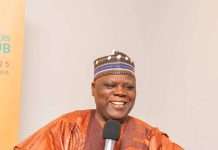In this insightful interview with Adebayo Folorusho-Francis, former vice chancellor of University of Nigeria, Nsukka (UNN), Prof. Oleka Kelechi Udeala, speaks on the intrigues surrounding his tenure as an “unwilling” vice chancellor, as well as his other memorable experiences as a veteran pharmacist. Excerpts:
Tell us about your early years
I was the youngest child of my mother’s five children and I received a lot of attention. I think I might have been a precocious child. I was fond of telling a cousin of mine about the possibility that while we had our night, some people somewhere would have their day. I was not yet of school age and never heard of geography. My cousin was intrigued and based on this wanted me to pay him a visit so that I could tell him things he did not know. Each time I did, he gave me a penny.
Art runs in my family and I started drawing and painting with pencil and crayons. By the time I was a freshman in USA I had started painting with oil and got into abstract painting, which was becoming the trend in the 1960s. Maybe it was what I saw at the Solomon Guggenheim Museum in New York City that inspired me. I was also good in drama so much so that in Secondary School, Reverend P.J. Collingwood said that if I were an English boy, he would have recommended that I study Theatre.
I like to create or make things. Whether it was in knitting a cloth or handkerchief – as the females were supposed to in their handwork at primary school – I easily copied and surpassed them, so much so that a boyhood friend of mine dubbed me omuru oka, which means one who surpasses his teacher.
What was your family like?
There were about 17 children in the family. My father showed no interest in Western education. So, it was an uncle I never knew that sent his first child, my mother’s eldest son, to school (Methodist College, Uzuakoli). I had a stepbrother, Joseph, who was also sent to school but died early in primary school under tragic circumstances.
The other male children were probably sent to Aba as apprentice in a trade or specifically tailoring under a relation or family friend. My eldest brother was the exception. When his guardian died, he could not continue with his secondary school education. He left school and got a job as an account or sales clerk with Paterson & Zochonis in Aba. The female children were married off or sent to serve in a home to learn how to keep a home. With two brothers and two elder sisters, I was soon left alone with my mother.
The fact that there existed names like Joseph and Abraham suggests that although my father was not a Christian, there was missionary influence in my family.
How did you manage to go to school?
I was made to live with my eldest brother in Aba to reduce the burden on my mother. This must have been around 1945 or 1946 because there were soldiers who had just returned from some war (World War II) regions. With his experience in secondary education and the effect that working for white people had had on him, my brother decided that I should go back to the village to start school in 1947.
Incidentally, at that time, my community was giving scholarship to all children who were qualified to begin school. The initial qualification was the ability to reach over one’s head with one’s right hand and touch the left ear with the middle finger. The final qualification was determined by lot. Wraps of a special leaf that contained gravel and others containing nothing were placed in a basket and passed around. Each child was made to pick a wrap out of the basket. Those whose wraps contained something won the community scholarship. Mine was empty, so my brother had to see me through my primary (1947–1953) and secondary education (1954–1958).
I obtained Grade One from Cambridge University in association with the West African Examination Council. From 1959 to 1960, I worked and studied for Higher School Certificate (Advanced Level). This qualified me for my first job as a science teacher in the Secondary School I attended. The Principal, Rev. E. B. Hall, encouraged me to sit for a competitive public overseas scholarship examination under the auspices of African Scholarship Programme by American Universities (ASPAU). I was successful and by August 1961, I was in USA to begin a baccalaureate degree programme at Brooklyn College of Pharmacy, Long Island University, Brooklyn N.Y. (1961–1965).
The fact that I had a Student J Visa did not permit any further academic activities after my graduation. The philosophy was that one should go back and serve one’s community. I came home some months later in 1966 in the midst of political crisis.
What circumstances led you to study Pharmacy?
What led me to study Pharmacy was an aggregation of circumstances. My Biology teacher, Mrs B. Hay, made us to take interest in professions like Medicine and Pharmacy in her teaching, which also was a sort of career guidance especially in our Advanced Level classes. Also, while my father was neither a traditional healer nor a herbalist, he knew about herbs and used them in treating people. This was apparently imprinted in my memory.
In addition, there was a time I was obliged to leave the village and stay with my eldest brother’s bosom friend, a newly qualified headmaster of a primary school. There was this ex-service man who probably was trained as a dispenser during World War II. He happened to have come from a village next to mine and bore the same surname as mine. Since the dispensary he headed was in the same locality, I was invariably sent to him for every childhood affliction such as intestinal worm infestations, constipation, chicken pox and wounds incurred during play. The large bottles containing “evil smell” and tasting mixtures or solutions such as Epsom Salt, Acriflavine, Iodoform or Tincture of iodine written in strange language intrigued me. The dexterity with which Dispenser Udeala with a shiny steel ‘knife’ burst abscesses, soaked a piece of gauze in a yellow liquid and inserted it in the abscess to get the pus out intrigued me no less.
What choice of study one made for ASPAU scholarship depended on what slot the participating American University had for Africans. I suppose I made the choice of Pharmacy over Medicine in the form I filled. The message came to the principal that a college of pharmacy would like to have me.
In retrospect, would you say studying Pharmacy was a good decision?
Yes! Looking back now, I think my choice of Pharmacy has been a very good one. Many people don’t realise that pharmacy degree curriculum exposes one to several disciplines of the applied sciences. This makes it a composite degree. Depending on which area of Pharmacy one is in, one may be confronted with problem or research akin to engineering (mechanical, design or structure), polymer, particle (nano particle), synthesis, formulation, bio-technology, powder technology and paper science technology.
If you had not studied Pharmacy, what other profession would you have chosen?
I might have chosen Medicine. By the time I graduated in Pharmacy, my American (adoptive) parents encouraged me to go into medicine at Columbia University. They indeed offered to speak on my behalf to someone they knew. I did not accept – ASPAU would not have allowed me because of my visa status. Besides I was already homesick.
However, I doubt if Medicine, in our part of the world, would have been as challenging as Pharmacy has been to me. Maybe Biomedical Engineering might have satisfied me
Tell us some of your memorable experiences in the course of obtaining your degrees.
I was a member of The Rho Chi Society and got Gold Pin for my academic performance. Outside Pharmacy, my memorable experiences encompass people I met, places I visited, how I got to the places, how I waded through racially divided America of the early 60s and how I lived in a society made up of people with strong views on their own side of the divide.
On arriving at the LaGuardia Airport, my first experience was to travel to New York City in a train under the Hudson River. During my summer vacation I had the fun of being at the top floor of Empire State Building, the highest skyscraper in the world then. Due to the fact that a project called Experiment in International Living was fitted into our arrival, I was just like other Nigerians sent to stay with an American family before our different universities re-opened. For me, the chemistry between this family and me was just right. The McKennas became my parents throughout my stay in USA.
Through these Irish-American parents, I met two persons whose names are in the history books. One was Dr Heinrich Bruning, Chancellor of Germany just before Hitler took over. He fled to America in 1934 having been a strong critic of Hitler who was in ascendency then. He loved seeing me as an opportunity to reminisce about World politics and German colonies in Africa. The other man was Professor Arthur Burns. Little did I know he was a professor of Economics at Colombia University and at the time I knew the family, he was the Chairman of the Federal Reserve Bank.
My American family came all the way from Norwich Vermont where I spent my vacations to take me to theatres in Broadway. Hence, I had the privilege of seeing live, The Sound of Music; West Side Story; My Fair Lady and other great musicals. ASPAU made life worth living by making sure I got free tickets to events in Broadway.
On the dark side was my experience in 1961 when I travelled with my adoptive family from Norwich Vermont to Washington DC and then to West Virginia. We stopped at Silverline Restaurant Route 40 Baltimore Maryland to have some snacks. As we walked through the door, we heard a roar: “We don’t serve them folks here!” You can trust Americans in making their feelings known. The majority of those seated got up and replied in unison: “If you don’t serve them folks here, we ain’t gonna eat here!” We all walked out. I got instant malaria fever for this was entirely new for a Nigerian.
In my college, made up of almost 95 per cent Jewish immigrants from Europe, I had a great time. Some invited me to their homes. During our class trip to Washington DC, my mates who knew what they wanted took me to a burlesque (performances in a variety show format, which featured bawdy comedy and female striptease). This was too much for my puritan upbringing.
Generally, the north of USA was fine. I made friends with students, African and White Americans. When I still had time, I even painted a picture in oil, Sunset over Brooklyn Bridge for Linda Rush and celebrated Passover in their home. Mr Newman, the Registrar of the College of Pharmacy took me to Reformed Synagogue for worship where I witnessed the reading of the Torah.
(To be continued).











